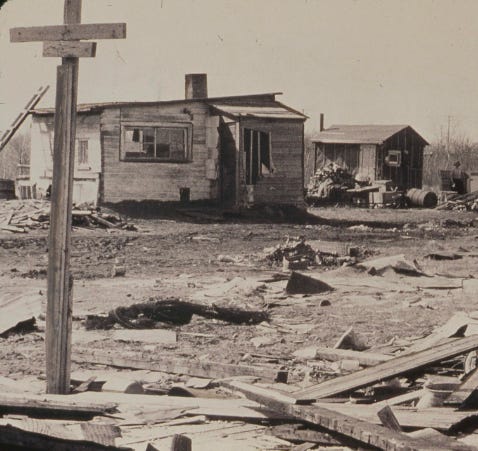“Taking care of kin, always thinking about them, it’s what holds us back, Grandpa. Keeps us poor. I can’t do it anymore. I’m out.”
As Stodge walked towards Rooster Town he thought about that day four years before when he said those sentences to his grandfather. In French, the only language his grandfather spoke. And which Stodge hadn’t spoken since.
He was also thinking about what he said to the chief that morning about the bullet that killed Gordon.
The day before Todd’s cousin told Stodge that he’d seen Todd toss something off the Louis bridge the night of the murder.
“So we’ll never find the gun,” said Stodge. “But if we can get Todd to tell someone it was a .38 calibre bullet, we got him.”
The chief shook his head. Then, after a couple more whiskeys, said, “Why not just sucker Todd straight out? Play to his pride and greed?”
Which was why Stodge was heading out to Rooster Town.
By this point, he had walked past the corner of Corydon and Wilton and was following the river’s curve along the CNR’s main railway tracks. The vista ahead was flat dirt punctuated by willow and scrub oak and some scrapwood shacks.
As Stodge could see already, a mile off, as always, the town was on the move. Not on the up and up but south, gradually, the residents once again dragging their self-built houses away from the new residential developments into the bush. Keeping their livestock beyond the reach of the city’s pound and their homes a few free steps ahead of the tax assessors.
His grandfather was dead and the Stodgell house was gone but he could still see and smell every inch of it. Tarpaper walls insulated with cardboard. The beds up a ladder in the attic. A damp sofa and a cot on the ground floor next to an old stove and two water barrels. Once a week, they had to haul the barrels three-quarters of a mile from a standpipe on Cambridge and Dudley. He remembered his older brothers crying from the cold and somebody on the way inviting them in to get warm and everyone going in gladly except him, he was too proud. By the time he’d pulled the sleigh home alone, his mitts were frozen stiff.
Rooster Town. A disordered blot where the city cast out its outcasts—Métis, French, Catholics, the poorest of the poor. Back then it was called the French settlement. The only church was a derelict storefront with camp chairs as pews.
“Death to the Pope! Death to Catholics! Death to the Half Breeds! Death to the priests!” He remembered that day too. He was seven. There had been a smallpox outbreak, traced correctly or incorrectly, as was every case of whooping cough and chickenpox, to Rooster Town. The good citizens of Winnipeg wanted the indolent vermin pushed out into the grasslands. Then they forced his mother into quarantine in the smallpox hospital, even though she only had a benign case of varioloid. After her third escape, they shackled her to a 25-pound ball-and-chain. She contracted the disease and died.
The family faired no better after that. Harry, the brother who slapped Stodge the day he said he was leaving Rooster Town to join the white man’s militia, got Métis scrip, bought washed-out land with it on the Red River, lost it to taxes, laboured at odd jobs. The other brother, Bert, became a fireman for the CNR. They both supplemented their income with petty crime. (Very petty. Harry stole someone’s snow shovel once and spent a month in jail.)
His sister Mary worked the Fort Rouge Hotel. His sister Louise married a house carpenter who pastured two cows and two horses and worked nights as a porter at the American Hotel on Main Street. His younger sister, Alice, died when the coal oil stove that she was refilling exploded. His brother Charlie was killed when a sewer that he was digging collapsed. Their children were placed in homes.
Harry, Bert, Mary, Louise, Alice, Charlie and Eli. He forgot their real names. Stodgell, too, an anglicized version of something long forgotten. And all those not dead and buried still holed up in shacks in Rooster Town.
Except Eli. Who everyone in his world called Stodge. And who was back in Rooster Town for the first time in four years. Looking for Harry and Bert. With an employment proposal from the Winnipeg chief of police.





Connelly’s good. This genre is tough! I’ve even developed serious respect for Lee Child…
As I gorge on LA crime mysteries-Micheal Connelly's best of-while in Punta Negra ,Mexico for a month-its great to get your Canadian historical one.